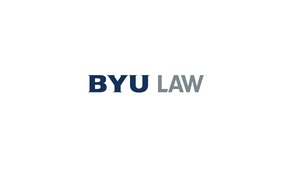PROVO, Utah, March 7, 2019 /PRNewswire/ -- BYU Law, a leading national law school focused on innovation in the legal field, held its fourth annual Law and Corpus Linguistics Conference February 6-8. The symposium brought together prominent legal and corpus linguistics scholars, as well as state and federal judges who have employed corpus linguistics analysis in their decisions. The conference is part of BYU Law's pioneering Law and Corpus Linguistics Project to further the study of corpus linguistics – the methodology for understanding the meaning of words by analyzing naturally occurring language in large collections of texts called "corpora." In addition to hosting this annual academic conference, BYU Law created the first course on law and corpus linguistics in the U.S., and continues to develop new legal research corpora and foster influential scholarship using this method.
"It is exciting to see how far we've advanced the study and practical use of corporate linguistics in the law since BYU Law first embarked on our Law and Corpus Linguistics Project," said D. Gordon Smith, Dean, BYU Law. "At this year's conference, Larry Solum, an internationally recognized legal theorist from Georgetown Law, noted that when we started this conference four years ago no one had heard of corpus linguistics. Today, legal scholars at Harvard, Yale and other notable law schools are taking notice, and while many are skeptical, it's a monumental pendulum."
Dean Smith added that during this year's symposium, participants debated Justice Antonin Scalia's and Justice John Paul Stevens' use of corpus linguistics to analyze the term "bear arms" from the Second Amendment for the Supreme Court case District of Columbia v. Heller.
"One of the great values corpus linguistics brings to judges and lawyers is a more transparent decision-making process," said Dean Smith. "You can actually look at how people use words in their natural speech to bring some evidence to bear on the question of ordinary meaning."
In September 2018, BYU Law launched the first Law and Corpus Linguistic Platform – a legal technology tool of massive proportions that makes available the first large-scale data sets of all U.S. Supreme Court rulings and founding-era documents to provide historical context for the usage and meaning of words. These new legal corpora include the Corpus of Founding Era American English, the Corpus of Early Modern English, and the Corpus of Supreme Court of the United States (the "SCOTUS Corpus"). Each contains millions of words from thousands of texts representing the language from a relevant period or court. This tool enables legal professionals to analyze the meaning of words in legal context to interpret statutes and the legislature's meaning in certain words that can be applied to current cases.
Ahead of the 2019 conference, BYU Law launched version 3.0 of its Law and Corpus Linguistics Platform. The update includes a simplified and more intuitive interface as well as the ability to compare terms within all the law-related corpora using concordance, frequency and collocates modes. The latest version of the platform and corpora are available to the public at https://lcl.byu.edu/.
BYU Law also hosted the first Judges' Workshop to provide hands-on training on use of the databases and how to signal to attorneys that they would like to see more corpus linguistics evidence. State and federal judges from the United States Court of Appeals of the Sixth Circuit, Georgia State and Supreme Courts, Idaho Supreme Court, and Utah Supreme Court received training from BYU faculty members on how to actually use the corpora using a number of real-world legal cases. They also discussed the applications and the limitations that jurists sometimes face in attempting to use corpus linguistics in their analysis and the challenges of applying one field to another.
The conference agenda included panel discussions about "Law and Corpus Linguistics Theory," "Law and Corpus Linguistics and the Second Amendment," "Constitutional Applications Panel and Corpus Linguistics" and "Corpus Linguistics and Legal Comprehension." Fourteen original papers addressing a broad range of topics and hot button issues related to the emerging discipline of law and corpus linguistics were presented, including the Emoluments Clause, Establishment Clause, and Twenty-Fifth Amendment. More information about the conference is available at https://corpusconference.byu.edu/2019-home/.
About BYU Law School
Founded in 1971, the J. Reuben Clark Law School (BYU Law) has grown into one of the nation's leading law schools – recognized for innovative research and teaching in social change, transactional design, entrepreneurship, corpus linguistics, criminal justice, and religious freedom. The Law School has more than 6,000 alumni serving in communities around the world. In its most recent rankings, SoFi ranked BYU Law as the #1 best-value U.S. law school in their 2017 Return on Education Law School Ranking. For more information, visit http://www.law.byu.edu/.
SOURCE BYU Law
Related Links
WANT YOUR COMPANY'S NEWS FEATURED ON PRNEWSWIRE.COM?
Newsrooms &
Influencers
Digital Media
Outlets
Journalists
Opted In





Share this article